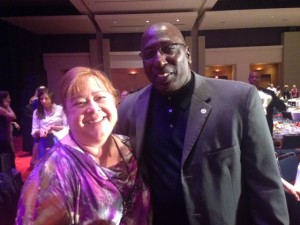Welcome to part one of our May 2018 Inspirational Interview with Bea Cote, Founder and Executive Director of IMPACT Family Violence Services and Step Up to Family Safety.
Bea Cote has worked with abusers for over 25 years, and her work is nationally recognised. She has served as chairperson of the DVAC (Domestic Violence Advocacy Council) in Charlotte, N.C.; Charlotte City Council appointee to DVAB (Domestic Violence Advisory Board); and NCPAT (NC Providers of Abuser Treatment). Bea trains clinicians on identifying, treating and referring when domestic violence is present.
Part 2 of Ms. Cote’s interview will be published on Monday 28 May 2018.
All pictures courtesy of Bea Cote.
________________________________________________________________________________________________
![]() 1. How and why did you join the movement to end violence against women?
1. How and why did you join the movement to end violence against women?
I was actually determined not to! My work had been in Child Protective Services, and that’s where my passion was. But as a social worker, I worked closely with families in their homes and communities, and when I first began managing a BIP (battering intervention programme), I wanted to focus on these abusers as fathers. The longer I did this work, the more I developed as an advocate against violence against women (VAW). I don’t think that anyone genuine in this work can deny VAW as the underlying — and overlying — problem. When you have man after man sitting in your group, at first presenting themselves as victims, and then slowly revealing themselves to having been abusive multiple times with multiple women, in such horrible ways…well, I am compelled to open the eyes of those who are steadfast in victim-blaming, woman-blaming beliefs.
2. While anti-violence against women organisations typically focus on helping victims and survivors, IMPACT is a North Carolina-certified abuse intervention programme for men age 16+ who acknowledge or have been found to have abused, coerced or controlled their partners or former partners. Why did you decide to create IMPACT to make the rehabilitation of male abusers and intervention in male violence your focus area?
I ran a large BIP and learned there that BIPs are the ONLY interventions we have that can and often do disrupt the cycle of domestic violence. We save lives. How can I say that? I know that for every man who stops abusing, there are multiple women and children who will not feel his wrath; his fists. We can’t say we come close to being effective with all clients; probably only a minority. But for the future partners of those men, those numbers count. Victim service providers provide help and healing, but only the abuser can stop the abuse.
3. Can you tell us more about IMPACT’s overall approach to stopping violence against women?
We are what is referred to as an “accountability-based” programme. We are not a mental health or anger management programme, because neither of those problems cause someone to decide to abuse their partner. We walk a fine line between counseling and accountability. As a therapist I use my clinical skills daily, but we don’t diagnose or “treat.” We believe that all men have the capacity for change and that most men, when provided different options to violence or abuse, choose this whole, new, differently gratifying way to be in relationships. There are great rewards to treating people well.
4. How has IMPACT’s work evolved over the past decade?
We are constantly evolving! I like change; I learn most from my clients and their victims as well as other advocates, but I also seek out the folks I admire and respect. I get really excited about new ideas, but I also try to be cautious when implementing larger changes. The beauty of having a small programme like mine — and maybe the only good thing about not being funded — is that my staff and I can make decisions about changes and implement them all in the same day! We started with a looser curriculum; now we have our own customised curriculum developed for us by Jeffrie Cape. One thing I love is the added dimension of mentoring and staying involved in our clients’ lives with the Legacy programme — more about that later!
5. Aside from IMPACT, you also founded Step Up to Family Safety – a nonprofit with a mission to connect abusers with intervention services, educate communities about domestic violence, and bring together experts across various fields to work together to stop domestic violence. Can you tell us about Step Up and its work?
Step Up is an accidental nonprofit organisation. We had clients wanting to help other men pay for their programme, and I mentioned to an intern who happened to be an attorney that it would be nice if we had some way for people to make tax-deductible donations, and BOOM! we got our nonprofit status. Almost immediately, we received a sizable donation from a family foundation that is generous every year. Now, we 1) offer scholarships to deserving IMPACT clients, 2) support Legacy and other unique and sexy programming. (Yes, I said sexy!) and 3) educate the community about the importance of work with the abusers. We’re still small and building our Executive Board — it’s a tough message to spread — one more reason I really appreciate the Pixel Project!
